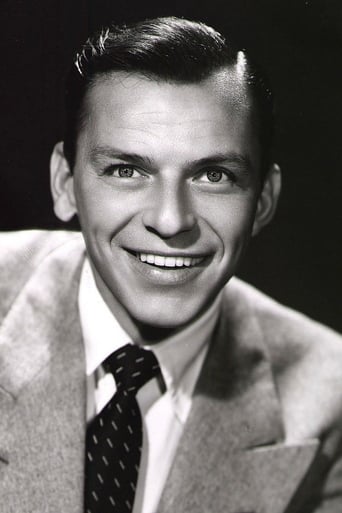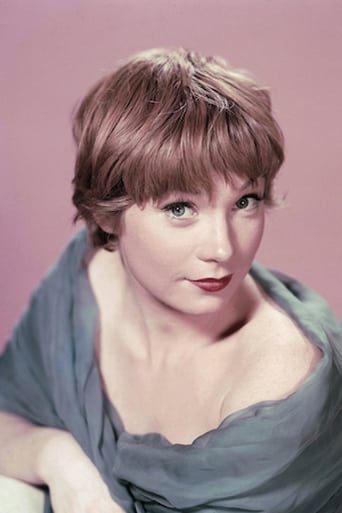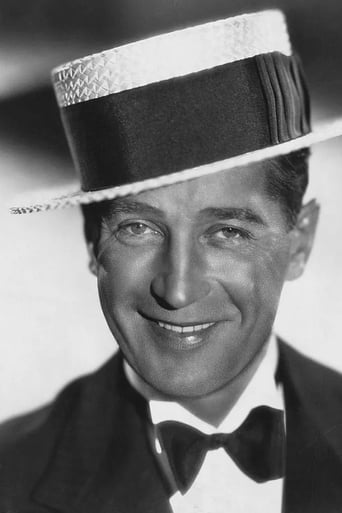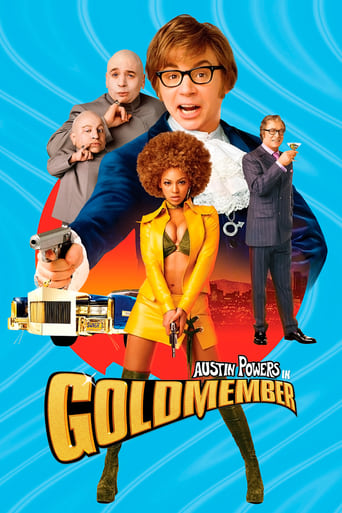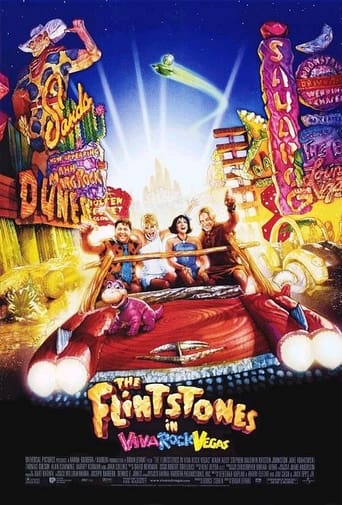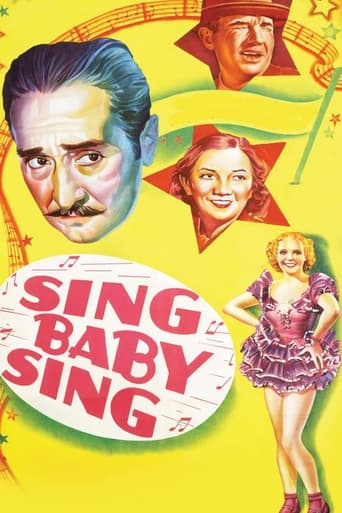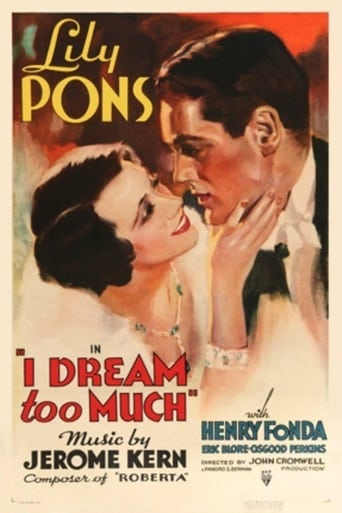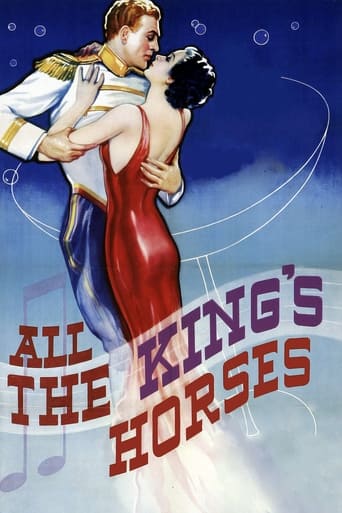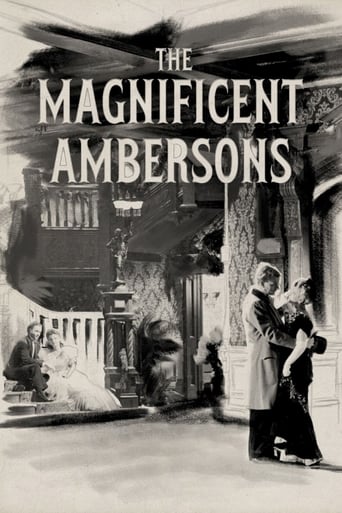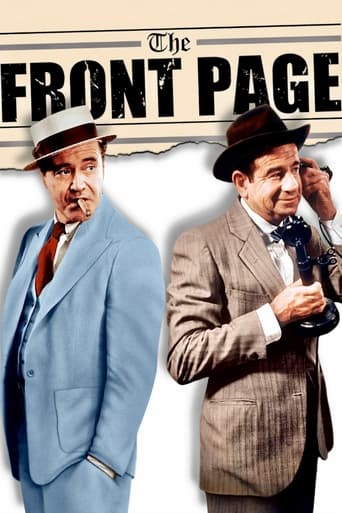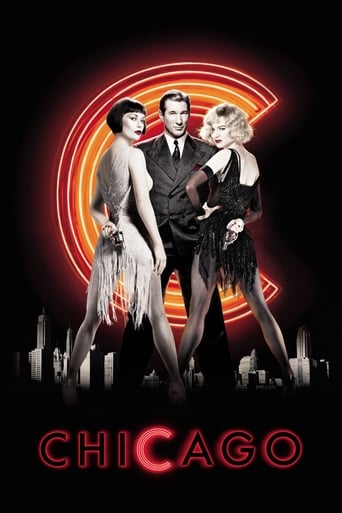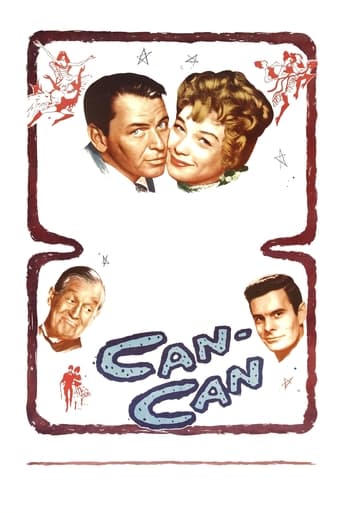
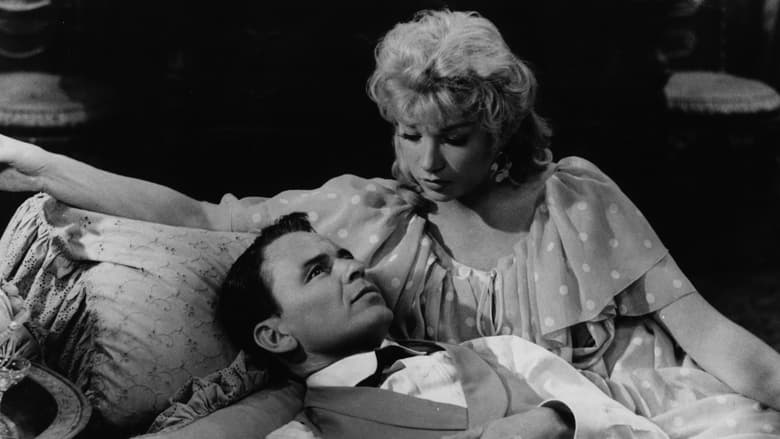
Can-Can (1960)
Parisian nightclub owner Simone Pistache is known for her performances of the can-can, which attracts the ire of the self-righteous Judge Philipe Forrestier. He hatches a plot to photograph her in the act but ends up falling for her — much to the chagrin of her boyfriend, lawyer François Durnais.
Watch Trailer
Cast


Similar titles
Reviews
While I agree with many of the ambivalent comments from other reviewers,"Can-Can" can only be fully appreciated on the giant Todd-AO screen,along with 6-track stereo. This becomes evident with the thrilling musical direction of Nelson Riddle.Besides the rich,stylish orchestrations,we have the equally stylish,sophisticated music of Cole Porter. The composer is well served with the two French actors.Louis Jourdan,not thought of as a singer,delivers the smoothest rendition of 'You Do Something To Me' I have ever heard. Maurice Chevalier is charming,as always and his 'Just One Of Those Things',along with the attractive presence of Louis Jourdan,provides one of the film's best moments. Now for my reservations.I feel that Frank Sinatra is miscast.He is far too glib and smug and seems to be moving in a different time-zone to most of the other players.Shirley MacLaine is also embarrassing at times;too American and shrill.Having said that,she has some bright moments and her dancing with Juliet Prowse in the final 'Can-Can' number is really exciting(provided it can be viewed on the giant screen). It's just a pity,given the talent involved,that "Can-Can" on film does not seem to totally satisfy very many people.Even so,there is clearly much left to enjoy.
After his greatest stage success (KISS ME KATE) Cole Porter entered the last decade and a half of his life with a track record of hit and miss musicals. It was not that he lost his abilities to compose great songs. It was that not everything he touched turned to gold.The "gold" of this decade was his music for SILK STOCKINGS (his version of NINOTCHKA) and his musical CAN-CAN. His misses included OUT OF THIS WORLD, his attempt at a modern retelling of the Amphitryon myth from Greece. OUT OF THIS WORLD has entered the history of Broadway as a potentially great musical that was too advanced for its period. Apparently much of the musical involved homosexual as well as heterosexual sex (in keeping with ancient Greek culture both forms of love were acceptable). Unfortunately they were not acceptable in 1950 New York City (and one may add in 2008 California and elsewhere). Only one number from OUT OF THIS WORLD survived: FROM THIS MOMENT ON. It got grafted into the film version of KISS ME KATE.It is a tradition that none of Porter's scores survived totally intact in Hollywood. Songs were dropped from films or pushed into others. So CAN-CAN has Let's Do It in the film score, although it was not in the musical (it was over thirty years old by that time), and yet I LOVE Paris, Porter's greatest anthem to the foreign city he adored above all others, was dropped from the film. Still there is enough Porter in this film to appreciate his best work. And as was said in another review, Sinatra's singing "But It's All Right With Me" to Juliet Prowse happens to be quite the best moment for old "Blue Eyes" in the film.The film tried to capitalize on the success (two years before) of GIGI, by reuniting Maurice Chevalier and Louis Jourdan from that film with Sinatra, and fellow rat-packers Shirley MacLaine and Prowse. Set again in the France of the 1890s, here we are not watching a young girl blossom into womanhood and win the man of her dreams, but we are watching the sleazier theatrical world of the day in the Montmartre District*. For MacLaine runs a dance hall/bar that has the town in a tizzy due to the dancing of the "forbidden" can-can by the dance hall girls. MacLaine's partner is her lawyer (and lover) Sinatra. When a bunch of reformers cause a raid on the dance hall, they just miss arresting Sinatra, MacLaine, and a corrupt (or friendly) jurist played by Chevalier. MacLaine has to appear in court, and the judge there is Jourdan, who is known to be incorruptible. He is, but he falls for MacLaine. It enables Sinatra to beat the legal attack temporarily, but it leaves MacLaine with a lovesick Jourdan to worry about.(*GIGI is not the only recent film that has an influence on CAN-CAN. The Montmartre area is where Toulouse - Lautrec and other painters of that period resided. The color of Huston's MOULIN ROUGE (1953) and the background of the cabarets Toulouse - Lautrec went to is evident in the film too. However, there even is a little joke (no pun intended). While singing the opening song "Montmartre", Sinatra is in the street, and passes Toulouse - Lautrec holding one of his canvasses. Toulouse - Lautrec shows it to Sinatra, who looks at it, and says, "It'll never sell!")The film follows MacLaine trying to get a commitment from Sinatra that will make their sexual relationship permanent, but he is too independent. So she is slowly finding the interest of Jourdan a kind of refreshing alternative (although she does suspect it just cannot work). Chevalier is pleased to see this troublesomely honest protégé of his somewhat corrupted so that he won't interfere with the business at the dance hall, but he realizes that Jourdan is serious enough to consider marrying MacLaine, and ruining his career. Their duet ("Your Business is Your Business, and My Business is Mine.") is not one of the best recalled Porter tunes, but it is a bouncy enough one, and it certainly illustrates Chevalier's realization that what was previously a useful slip by Jourdan is now totally out of hand.The conclusion of the film is set in the dance hall, where the puritan critics are given a demonstration of the sinful dance, and discover it has a charm and excitement they had not expected. The dance sequence at the end was the only time that MacLaine (a pretty affective dancer before she became an actress) shared film dance time with Prowse. Juliet Prowse was a mediocre actress at best (see my review of MONA MCCLUSKY, her attempt at a sit com), but she was a first rate dancer, and the production number of her and MacLaine leading the Can-Can is quite memorable. The number is a fine way to end the film, and also for it to enter diplomatic history. As pointed out elsewhere on this thread, Khrustchev was touring Hollywood when they were shooting Can-Can, and watched the dance number being shot. He did condemn the film as proof of the decadence of the west. However, that did not prevent him from having his photo taken with Sinatra and MacLaine. I guess there is decadence and there is decadence.
Another Cole Porter Broadway show makes it Hollywood, but not intact. Can Can retained most of its score, but 20th Century Fox added some other Porter standards like Let's Do It. Just One of Those Things, You Do Something To Me. And of course the book was sanitized by the Hollywood censors.Briefly the plot is a girl who's a Can Can dancer played by Shirley MacLaine has to choose between two men of the legal profession. Upright judge, Louis Jourdan and less than scrupulous attorney, Frank Sinatra. Maurice Chevalier is an older judge who knows all of them and presides over the film like an avuncular grandfather.The performers all do justice to the Cole Porter score and the best musical moment is Frank Sinatra's singing of It's All Right With Me. He's singing it to Juliet Prowse who was his main squeeze at the time. It's one of Sinatra's best musical moments on film, a perfect mating of singer and song.I'm sure glad neither Sinatra or MacLaine attempted any kind of phony French accent. Sinatra tried a Spanish one in The Pride and the Passion and the results were hilarious.Shirley MacLaine before she came to Hollywood was in the chorus of Can-Can on Broadway so she was a perfect fit for her part as Simone Pistache the cabaret owner where the illegal Can-Can is performed.For reasons I don't understand a duet with Frank Sinatra and Maurice Chevalier singing I Love Paris was cut, though it remained in the original cast album. Blockheads at Fox, what were they thinking?It also would have been nice to have some Paris location shooting for this film, it was all done at 20th Century's backlot where Nikita Khruschev paid a historic visit and said this was an example of western immorality and decadence. You couldn't buy that kind of publicity.Verdict on this film, well as Old Blue Eyes sang:RING-A-DING DING DING, C'est Magnifique.
Well, Can-Can is not a total loss, but it's not a 10-star gem of a movie either, but - it IS entertaining, but the biggest problem that I see with the film is that everyone looks like they're embarrassed to be in the movie with each other because no one is actually looking at each other when they're saying their lines. Look at the scene where Shirley McClain is making up the story as to how Louis Jourdan was trying to overcome her sexually and the scene goes something like this:SHIRLEY: And I fought him and fought him and stuggled, but what could a person do? MAURICE: [embarrassed to say] Uh - submit - of course! SHIRLEY: [slightly glances at thim and them says loudly] SUBMIT?The film just kinda lays there and doesn't do anything. Come on - it's not Gigi! It was really a re-uniting of Louie and Maurice because of their hit movie Gigi and that's about where the uniting ends, but there are some highlights to the film. Shirley McClaine's apache dance with the guys while Louis Jourdan looks on is a great number, and the Adam and Eve Ballet is quite good and Shirley's line before the ballet is wonderful when she says something like this: "Be it known that sin may have been invented in the Garden of Eden, but it was perfected in Monemart!"It just seems like all they're doing in the film is walking through their dress rehearsal without putting any oomph into the acting, and at the same time the some of the costumes are so tacky that they look like we did as kids when we played dress-up as adults! And, look at the scene before Maurice and Louis sing "Live and Let Live". It looks like it was inserted on purpose so that they could have the opportunity to sing the song, and the scene in which Maurice sings "It Was Just One of Those Things". Even that looks like it was inserted on purpose just to give him a chance to sing a song, but the songs are great even though most of them were never in the original broadway play such as "You Do Something To Me", "Let's Do It", and "It Was Just One of Those Things", "It's Alright With Me" [which is slow and a very boring rendition], and oddly enough "I Love Paris" a duet between Frank Sinatra and Maurice Chevalier was deleted from the movie and only heard in the the original soundtrack album, and the Oveture and beginning Credits of the video, that is if you have the first video version of Can-Can in which you get the Oveture, Intermission Music, and Exit Music with all the musical numbers letter-boxed, and why they deleted "I Love Paris" from the movie is beyond me since it was the hit of the show. Again, Hollywood has been known to do some dumb stuff!Juliet Prowse's big number "Maids From France" is quite good, but it's obvious why she's in the scene with Frank Sinatra when he sings "It's Alright With Me" because at that time they were having an affair, and I guess if it was alright with them it should be alright with us, but later he would marry Mia Farrow and since Frank was Italian it was only obvious that his kids would call her "Uh-Mama Mia"!Anyway, I sure wish they would re-release the original video version of "Can-Can" or a whole widescreen version on D.V.D.. Other songs from the Broadway Show were deleted from the movie such as "Never Give Anything Away" "Al-e-Vou-Zon" [which is only used in Shirley McClains apache dance as a melody] "There Is No Trick To A Can Can" which is just used as a melody for the Can-Can at the end of the movie, and again even though they deleted a singing version of the hit of the play "I Love Paris", at least they use the melody of it in the Adam and Eve Ballet, but Shirley McClains drunken version of "Come Along With Me" is delightful, and here goes the insanity of Hollywood again, at the end of the film when the Paddy-Wagon is pulling away with Shirley and Frank in it - the chorus is singing the last lines of "I Love Paris"!So - why didn't Louis get Shirley in the end? Well, it's obvious that she was in love with Frank Sinatra all the time, but more than that; "Once a Rat Packer; always a Rat Packer"!


